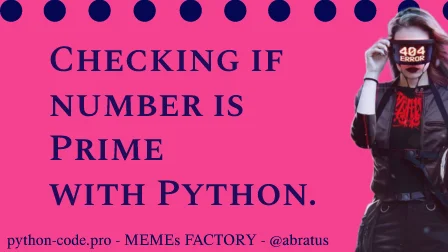Prime numbers use case.
In mathematics a prime number is a natural number that is greater than 1 that is not a product of two smaller natural numbers.
In opposite to prime a composite number is a natural number greater than 1 that is a product of two smaller natural numbers.
So all the natural numbers greater than 1 are prime or composite.
The property of being prime is called primality.

Python Knowledge Base: Make coding great again.
- Updated:
2025-07-13 by Andrey BRATUS, Senior Data Analyst.
Python Function to check if a number is prime:
Prime number function check result:
Today’s practical use cases of the Prime numbers lay in the fields of cryptography, geometry, biology, and quantum mechanics.
Checking if number is Prime is one of the most common job interview questions for Python programmers.
def prime(number):
if number > 1:
for i in range(2,number):
if (number % i) == 0:
print(number,"is NOT a prime number")
print(i,"times",number//i,"is",number)
break
else:
print(number,"IS a prime number")
else:
print(number,"is NOT a prime number")
# Check
prime(24)
print('\n')
prime(23)
OUT:
24 is NOT a prime number
2 times 12 is 24
23 IS a prime number
